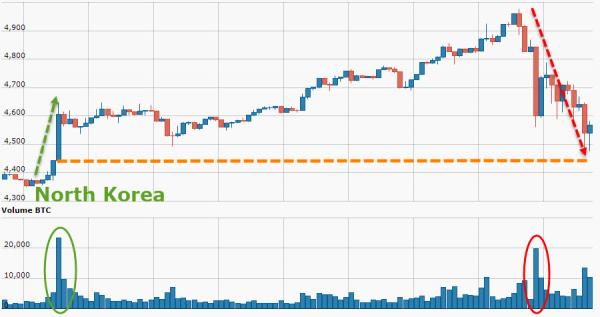Shortly after topping $5,000 (according to several exchanges), Bitcoin began to tumble dramatically – now down almost $500 – erasing all the post-North-Korea missile anxiety gains.

Ethereum has crashed even more.

In fact, 9 of the 10 largest cryptocurrencies are all plunging this morning.

While there is no specific catalyst for this drop, two events have been cited: in the US, regulators have begun officially cracking down on ICOs.
It’s starting. pic.twitter.com/ZpfW8Kb9jT
— BitCrypto’ed? (@Bitfinexed) September 1, 2017
Meanwhile, one of the world’s largest bitcoin exchange, Shanghai-based BTC China, announced it had suspended ICOCoin deposits as well as trading and withdrawals, starting 6pm on Sunday, while Caixin reports that authorities shut down a blockchain conference over the weekend on concerns unregulated Initial Coin Offerings were being used to raise funds illegally, adding that Chinese market regulators have begun cracking down on ICOs as “illegal fundraising vehicles” in disguise, and in taking a page out of the SEC playbook, will soon issue official rules on ICOs.
As CoinTelegraph adds, the self-regulatory group National Internet Finance Association of China warned its members about the dangers in participating in initial coin offerings (ICO). The group claimed that ICOs could be using misleading information as part of fundraising campaigns. In a statement in late August 2017, the online finance organization further warned its member companies to exercise extreme caution when dealing with the new fundraising mechanism. Part of the statement reads:
“China Internet Finance Association members should take the initiative to strengthen self-discipline, to resist illegal financial behavior.”
The National Internet Finance Association of China was created by the People’s Bank of China in 2016 to serve as a partner of government agencies in tackling regulatory issues and developments. The group has more than 400 members that include financial institutions such as banks, securities companies and consumer finance firms, as well as other organizations like guarantee companies, Internet peer-to-peer firms and credit services. Among the companies were peer-to-peer wealth management firm CreditEase, Lufax and Wangxin.
















Leave A Comment